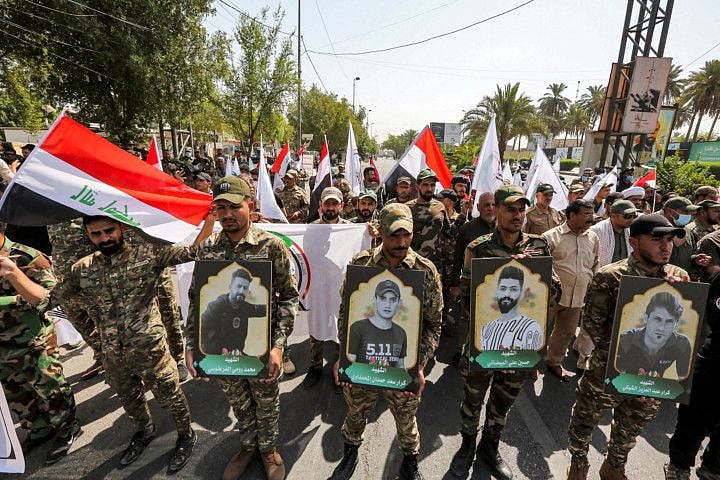Iraq caught in middle as US, Iran spar on its soil
Militias: ‘From now on, we will go to open war with the American occupation’

Also In This Package
Pictures: Pope, top Iraq cleric hold historic meeting
See: Pope Francis begins first-ever papal visit to Iraq
Gift for Francis: Shawl tells story of Iraqi Christians
Pope Francis visits Mosul, former HQ of Daesh
In Pictures: Iraq prepares for Pope Francis' visit
See: Christmas cards bring cheer to Iraqi Christians
Baghdad: American airstrikes against two Iranian-backed militias on Monday were just the latest skirmish in a conflict between the United States and Iran that is playing out on Iraqi soil.
Iran has relied on the militias to attack US assets in Iraq, putting pressure on the United States while the two countries engage in indirect talks over their nuclear deal in Vienna. Monday’s airstrikes were the second time the Biden administration has responded militarily to the harassment.
But the conflict between its two powerful allies has put Iraq squarely in the middle. Unable to rein in the Iranian-backed forces or to stop the United States from retaliating, Iraq now faces the biggest threat to its stability since Daesh was marching toward Baghdad in 2014.
On Monday, it strongly protested the US attack on its soil.
The Iraqi government described the strikes as a “blatant and unacceptable violation of Iraqi sovereignty and national security.” Maj. Gen. Yahya Rasool, military spokesperson for Prime Minister Mustafa Al Kadhimi, urged de-escalation and said Iraq did not want to be turned into an “arena for settling accounts.”
The strikes hit facilities used by two militias that the Pentagon accused of involvement in recent drone attacks on American bases in Iraq. The Pentagon said Monday that the overnight airstrikes were meant to send a message while avoiding escalation.
But Saeed Khatibzadeh, spokesperson for the Iranian Foreign Ministry, said the United States was disrupting the security of the region.
The strikes also revived questions about the future of about 2,500 US troops remaining in Iraq, where they serve as one of the country’s main security partners.
The government in Baghdad has been unable to stop attacks on its US allies by the Iranian-backed militias, even though they are on the government payroll as the country tries to integrate them into its regular security forces.
The Pentagon said the strikes had hit both sides of the Iraqi-Syrian border. Two of the targets were just across the border into Syria and the third was inside Iraq.
Al Kadhimi, the prime minister, called an emergency meeting of security advisers to discuss the airstrikes. The Iraqi Cabinet called them “a flagrant violation” of international law and said Iraq was in the advanced stages of dialogue with the United States on what it said were the logistical details of removing US combat forces from the country.
The United States and Iraq have been negotiating a new framework agreement governing security and other cooperation. Similar statements by the Iraqi government about an agreement to withdraw US combat forces have been aimed at catering to Iranian-backed political parties and militias demanding their removal.
The American troops are in Iraq at the invitation of the government, which still relies on US air power, intelligence, reconnaissance and surveillance to help fight remnants of the Islamic State group.
The two militias that were targeted in the strikes, Kata’ib Sayyid Al Shuhada and Kata’ib Hezbollah, are part of the Popular Mobilisation Forces umbrella group, which formed to fight Daesh in Iraq in 2014. The forces mobilised following a fatwa, or religious edict, from Iraq’s most revered Shiite cleric, Grand Ayatollah Ali Al Sistani, when Daesh was nearing Baghdad in 2014.
Most but not all of the groups are Shiite Muslim, who are a majority in Iraq, and the most powerful ones are backed by Shiite Iran. In 2016, they were merged into the Iraqi government’s security force.
Despite that, the most powerful militias on the Iraqi government payroll are only nominally under control of Baghdad. The Popular Mobilisation Forces are made up of more than 50 paramilitary groups with an estimated 160,000 fighters.
Iran over the past two years has decreased its financial support for proxy paramilitary groups in Iraq, Syria and Lebanon because of the effect of US sanctions, lower oil prices and the pandemic. So the dozens of militia forces under the umbrella of the Popular Mobilisation Forces have relied more on Iraqi government funding and moneymaking schemes that include oil smuggling and extortion at Iraqi borders and ports, according to security analysts and government officials.
American officials said they had not relied on Iraqi intelligence to identify and monitor the targets hit overnight, and had not consulted with the Iraqi government in advance. It was not known whether the United States notified Russia before the airstrikes on the Syrian side of the border, but both countries operate in the same airspace in Syria.
The group Kata’ib Sayyid Al Shuhada said four of its fighters stationed along the border had been killed in the strikes.
“From now on, we will go to open war with the American occupation, the first action of which is targeting the enemy planes in beloved Iraq’s sky,” the group said in a statement.
Sign up for the Daily Briefing
Get the latest news and updates straight to your inbox
Network Links
GN StoreDownload our app
© Al Nisr Publishing LLC 2026. All rights reserved.